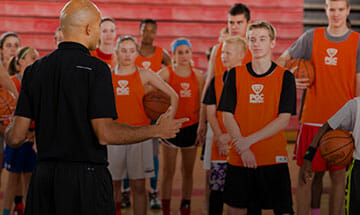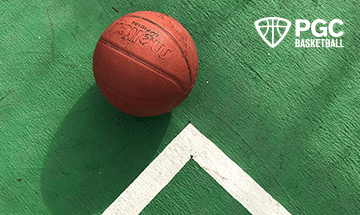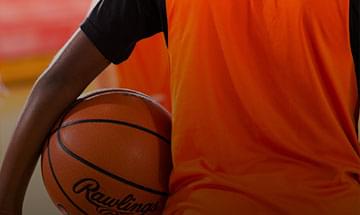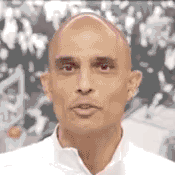How Your Index Finger can be hurting your playing time
We, humans, should be most appreciative of our thumbs. They are pretty super little tools and they help us do things that most other species can’t achieve: jump rope, have thumb wars, and let’s not forget maybe the most important – playing Super Mario Kart. (Man, I miss those red turtle shells!)
Personally though, I’m partial to the index finger. Our index finger is so valuable. In basketball, the index finger is the primary aiming finger in a normal follow through for most good shooters. It’s also the finger that directs our attention to important things. Would it have been as special when the original ‘Bird Man’, Larry Bird, shot his final 3-pointer during the 1986 NBA All Star 3-Point Shooting Contest if he would have turned and raised any other finger? No Way! It would have been offensive in one case, weird in another, and way less cool if he had given a thumps up.
The index finger is also used to display our feeling of being the best, being a champion, being Number One. I want to direct our attention to how we misuse our index finger. Many current athletes are culprits. As great as the index finger is, it can be used in a very negative way when it is turned from the up position, to a horizontal position indicating blame.
Pointing the finger and blaming others is an epidemic affecting more and more basketball players. When I talk to athletes at the end of basketball seasons, more than 70% bring up how they didn’t have much help from their teammates or the referees were the reason they lost a big game or their coaches weren’t very good or the MOST common – their basketball coach was the reason they didn’t play very much.
After a clinic in Indiana, Coach Josh Kendrick gave me a book, QBQ: The Question Behind the Question, by John G. Miller. The book, an excellent tool to practice personal accountability and eliminating blame, was given with the intention of helping me as I speak at schools using comedy to inspire young people outside of athletics. After reading it, I think it can be a better tool to serve the basketball players I am fortunate enough to work with.
An excerpt from the book discusses how to avoid the ‘blame questions’ and ask the Questions Behind the Questions or QBQ’s instead:
3 Guidelines to an effective QBQ
-
Begin with ‘What’ or ‘How’ questions (not why, when, or who).
- Instead of “Why don’t others work harder?” ask, “How can I do my job better today?”
-
Contain an ‘I’ (not they, them, we, or you).
- Rather than “Why is this happening to me? or Why doesn’t coach like/play me?” think, “What can I do to improve the situation/improve myself?”
-
Focus on action.
- Move away from “Why do they make it so difficult for me to do my job?” to “How can I support others and be the best teammate possible?”
Obviously there are no absolutes and I’m sure you could stretch a ‘what’ or ‘how’ question from a QBQ into a blame question, but it’s a good rule to help you examine the thoughts you’re having at any point in the basketball season or during the summer months.
I think one of the best questions we can ask ourselves after a tough season or in any situation is “What could I have done better?” or “How could I have done more?”
I’ll confess that as a young athlete, prior to attending Point Guard College, I’d often blame my height or a coach not liking me as a reason for not enough playing time. After PGC, I realized I had to change my mentality and quickly adapted the thinking of “I’m going to become such a good shooter, such a good player, that coach HAS to have me on the court.”
I often challenge athletes not to point the focus outward, but to self-examine and really think: “Were there situations this season where I could have worked harder or done more?” The answer is always a resounding YES.
I’ll wrap up with a thought about ‘politics’ from Dick DeVenzio because, in athletics and in life, we’ll face some sort of politics:
Athletes, think about this – coaches are human. If it’s not clear which player is better, then we’re definitely going to play the person we like more. I would – WE’RE HUMAN.
So instead of using excuses, look inward and think, “What more could I be doing to improve.” Were there times this season when, instead of playing video games or going out with friends, I could have been in the gym doing a basketball shooting workout or some ball handling drills?
Use this off-season and the time in season efficiently and get SO GOOD, your coach HAS to play you. GET BETTER.
Related Articles
5 Ways to Practice Mental Toughness
Here are five ways to practice your mental toughness off the court. If you practice these five things, every day, you’ll develop greater self-discipline. You’ll become unstoppable in anything you do. It is five things you will have to rise above your feelings every day. That is how you build mental toughness. You develop, as a habit, a muscle of rising above your feelings to level of your aspirations and commitments.
The Beauty of the Game | The Leadership Podcast
Mano joins Jan Rutherford & Jim Vaselopulos, on The Leadership Podcast to talk about his sports and business experiences with stories and advice on thinking like a coach, communicating, and making a difference in people’s lives.
The Way I End Each Year
For the past few years, I have taken time over the holidays to do the same two exercises: On New Year’s Eve I take time to reflect back on the year; then on New Year’s Day I take time to create my plan for the coming year. These few hours have become really special to me. In fact, I look forward to them with great anticipation. Looking back on the year gives me the chance to pause to celebrate and appreciate all that transpired. My reflection process is the same each year.
About PGC
PGC Basketball provides intense, no-nonsense basketball training for players and coaches. Our basketball camps are designed to teach players of all positions to play smart basketball, be coaches on the court, and be leaders in practices, games and in everyday life.
We combine our unique PGC culture with a variety of teaching methods and learning environments to maximize the learning potential of those that attend our sessions. In addition to spending 6-7 hours on the court each day, lessons will be reinforced through classroom sessions and video analysis.
Our goal at PGC is to empower you with the tools to fulfill your basketball dreams, while also assisting you in experiencing the joy of the journey.
To learn more about PGC Basketball, including additional basketball training tips and videos, visit our YouTube Channel or find us on Facebook, Instagram, and Twitter.













Share This Post